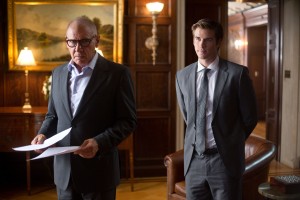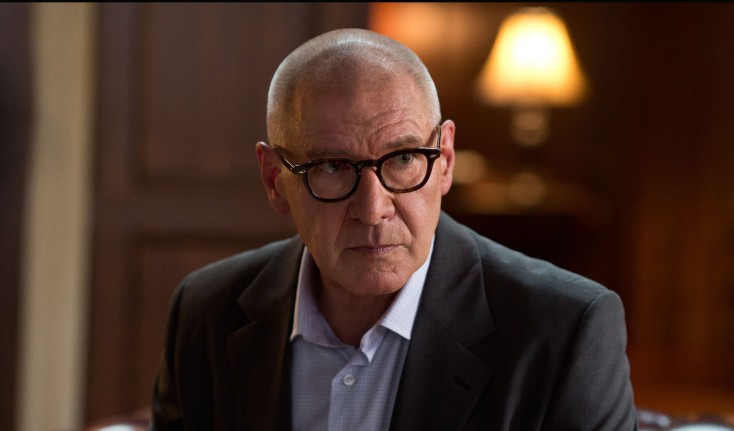
(Left to right.) Harrison Ford and Liam Hemsworth star in Relativity Media’s “Paranoia.”© 2013 Paranoia Productions, LLC. CR: Peter Iovino.
By ANGELA DAWSON
Front Row Features
HOLLYWOOD—Harrison Ford doesn’t want to be “Liked.” As in, he doesn’t want complete strangers—or even his friends—to “Like” him on Facebook or any other social media websites.
“I don’t want to be (electronically) connected to my friends,” says the 71-year-old action star best known for his “Indiana Jones” and “Star Wars” roles. “I don’t want to send snapshots of my dog and cute pictures of my family life to my friends.”
Just give him a good book to read—not an e-book, mind you—and he’ll be content.
But Ford also is an actor, and as such he often plays characters that are in stark contrast to his own personality. In “Paranoia,” for example, he plays a ruthless corporate titan who will stop at nothing to produce the latest gadget for the mass market that will swell is already sizable fortune.
In the Robert Luketic-directed action drama, Ford plays tech billionaire Jock Goddard, who wants to wipe out his shrewd business rival (Gary Oldman) once and for all. Both men are willing to do anything to destroy the other, including engaging in corporate espionage. When Oldman’s character recruits a young whiz kid (Liam Hemsworth) to spy on his rival, Ford’s Goddard proves that he has a few tricks up his sleeve as well. It’s a high-stakes game of chess, with innocent expendable pawns used by these very dangerous competitors.
Coming off the success of “42,” in which he played Brooklyn Dodgers owner Wesley “Branch” Rickey, who broke the color barrier in 1945 by signing African-American Jackie Robinson to a minor league contract, Ford does a 180-degree turn portraying a very different sort of businessman. Ford, who is famous for playing heroic leading men roles, is almost unrecognizable as the bald billionaire tech titan in this Jason Hall and Barry L. Levy scripted adaptation of Joseph Finder’s bestselling novel.
Q: Goddard lives a very lavish lifestyle in a beautiful estate home. How much did the setting inform your performance?
Ford: I did have a very impressive home that Robert (Luketic) found for me, which I think informed my characterization. The places that you see the character—his office and his home— I think are really important and I cared a lot about that. The character I play was created to tell this story that we’re telling and the shades of his nature and how they were presented were part of the drama of the film. It was a great opportunity for me and I really enjoyed being in the film and working with Robert and Liam (Hemsworth). It was a very good experience for me.
Q: What is your relationship with technology?
Ford: One of the things the film talks about, which to me is the most interesting, because I never presumed there was such thing as privacy, is that if you offer people something or create a perceived need or value in a service that you offer, people will forget about privacy and want that newest wrinkle in technology and we’ll give up freedoms and personal privacy in order to have it. That’s the nature of marketing for these kinds of devices.
Q: What was it like working with Gary Oldman, especially your confrontation with him in the film’s climax?
Ford: I worked with him about 20 years ago on “Air Force One,” and when I knew he was attached to this film, it was a big part of the draw. I enjoyed very much working with him on “Air Force One” and I was looking forward to the opportunity to work with him again. He’s fun and you never know what he’s going to do, what he’s going to look like, who he’s going to be. I enjoyed it and we had a good time.
Q: Your character is a very competitive corporate animal. How does that competitive spirit apply to your acting career?
Ford: It doesn’t apply. Acting isn’t about competing. It’s about cooperating and collaboration and your usefulness and your capacity to add to the work that has already been done and will be done. You’re just part of a team. I never feel competitive about acting.
Q: What did you make of your character?
Ford: For me, a character is made up out of those things that help tell the story and my own experience, which helps me string it all together. This is a character whose a preceded in his appearance onscreen by a body of opinion about him— who he is, what he is, how he’s behaved in the past so I wanted my first appearance on screen to complicate that. Robert was wonderfully collaborative about things like that. When I showed up with a shaved head, he was ok with that. When I said I wanted to wear blue jeans and a t-shirt to my fancy, backyard house party, he was OK with that. Those are the kinds of things, which I used to help describe and complicate a character. The guy is bad to the bone but there’s fun in seeing that presented that way. I thought there were interesting opportunities in the construction of the script and the sophistication of the filmmakers that would allow me to create a character that’s different to what I’ve played before.
Q: You weren’t even wearing shoes were you?
Ford: In the backyard? No, he’s too rich for that. (He laughs.)
Q: How interested are you in electronics and having the latest gadgets in real life? You’re a pilot, so I imagine you’d be quiet interested in instruments.
Ford: I grew up in the Stone Age. (Flying aircrafts) is one capacity that I have developed because I wanted to but I don’t want to be a slave to electronic devices. I use all of this technology to basically replace devices that I had in the past that worked just fine. I don’t really use it. I like books. I don’t like to read things on the Internet. I don’t have much of a connection to it.





